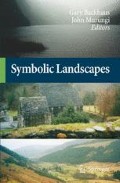This chapter explores the geographicity of the human condition, of the existential structures of being-in-the-world. The geographical turn is exemplified in the author’s interpretation of Defoe’s famous novel. Existential structures such as thrownness and anxiety are given spatial illustration. But, these illustrations, in turn, further provide us with spatial existential structurings such as the “tame” and the “wild,” which involves establishing modes of comportment that consider qualitative differences in the range of circumspection. What is insightful is that a work of art providing a geography of the imagination can provide profound insight into the spatial existentialities of the human condition and geographies of the actual.
Access this chapter
Tax calculation will be finalised at checkout
Purchases are for personal use only
Preview
Unable to display preview. Download preview PDF.
References
Cibber, Theophilus. “The Success of Robinson Crusoe.” In The Lives of the Poets. London, 1753. Excerpted in Robinson Crusoe, A Norton Critical Edition. Edited by Michael Shinagle, 261–262. New York: W. W. Norton, 1994.
Defoe, Daniel. Robinson Crusoe. New York: Walter J. Black, 1949.
Defoe, Daniel. “Preface to Volume III, Robinson Crusoe,” from Serious Reflections Concerning the Life and Surprizing Adventures of Robinson Crusoe. London, 1720. Excerpted in Robinson Crusoe, A Norton Critical Edition. Edited by Michael Shinagle, 240–243. New York: W. W. Norton, 1994.
Derrida, Jacque. Of Grammatology. Translated by Gayatri Chakravorty Spivak. Baltimore, MD: Johns Hopkins University Press, 1974.
Heidegger, Martin. Being and Time. Translated by John Macquarrie and Edward Robinson. New York: Harper & Row, 1962.
Heidegger, Martin. The Question Concerning Technology. Translated by William Lovitt. New York: Harper & Row, 1977.
Heidegger, Martin. Nietzsche, Nihilism, 4th vol. Translated by David Farrell Krell. San Francisco, CA: Harper Collins, 1982.
Husserl, Edmund. Cartesian Meditations: An Introduction to Phenomenology. Translated by Dorian Cairns. The Hague: Martinus Nijhoff, 1969.
Joyce, James. “Daniel Defoe,” Buffalo Studies 1, no. 1 (1964). Excerpted in Robinson Crusoe, A Norton Critical Edition. Edited by Michael Shinagle, 320–323. New York: W. W. Norton, 1994.
Marx, Karl. Capital. Translated by Samuel Moore and Edward Aveling. Chicago, IL: Charles H. Kerr, 1921. Excerpted in Robinson Crusoe, A Norton Critical Edition. Edited by Michael Shinagle, 274–277. New York: W. W. Norton, 1994.
Novak, Maximillian E. Defoe and the Nature of Man. New York/London, 1963. Excerpted in Robinson Crusoe, A Norton Critical Edition. Edited by Michael Shinagle, 309–320. New York: W. W. Norton, 1994.
Rousseau, Jean-Jacques. Emilius and Sophia: Or, a New System of Education. London, 1762. Excerpted in Robinson Crusoe, A Norton Critical Edition. Edited by Michael Shinagle, 262–264. New York: W. W. Norton, 1994, 262.
Sartre, Jean Paul. Being and Nothingness: An Essay on Phenomenological Ontology. Translated by Hazel E. Barnes. New York: Philosophical Library, 1956.
Wolfe, Virginia. “Robinson Crusoe.” In Common Reader. Harcourt and Company, 1932. Excerpted in Robinson Crusoe, A Norton Critical Edition. Edited by Michael Shinagle, 283–287. New York: W. W. Norton, 1994, 282.
Author information
Authors and Affiliations
Corresponding author
Editor information
Editors and Affiliations
Rights and permissions
Copyright information
© 2009 Springer Science + Business Media, B.V
About this chapter
Cite this chapter
Skocz, D.E. (2009). Crusoe’s Island and the Human Estate: Defoe’s Existential Geography. In: Backhaus, G., Murungi, J. (eds) Symbolic Landscapes. Springer, Dordrecht. https://doi.org/10.1007/978-1-4020-8703-5_18
Download citation
DOI: https://doi.org/10.1007/978-1-4020-8703-5_18
Publisher Name: Springer, Dordrecht
Print ISBN: 978-1-4020-8702-8
Online ISBN: 978-1-4020-8703-5
eBook Packages: Humanities, Social Sciences and LawPhilosophy and Religion (R0)

